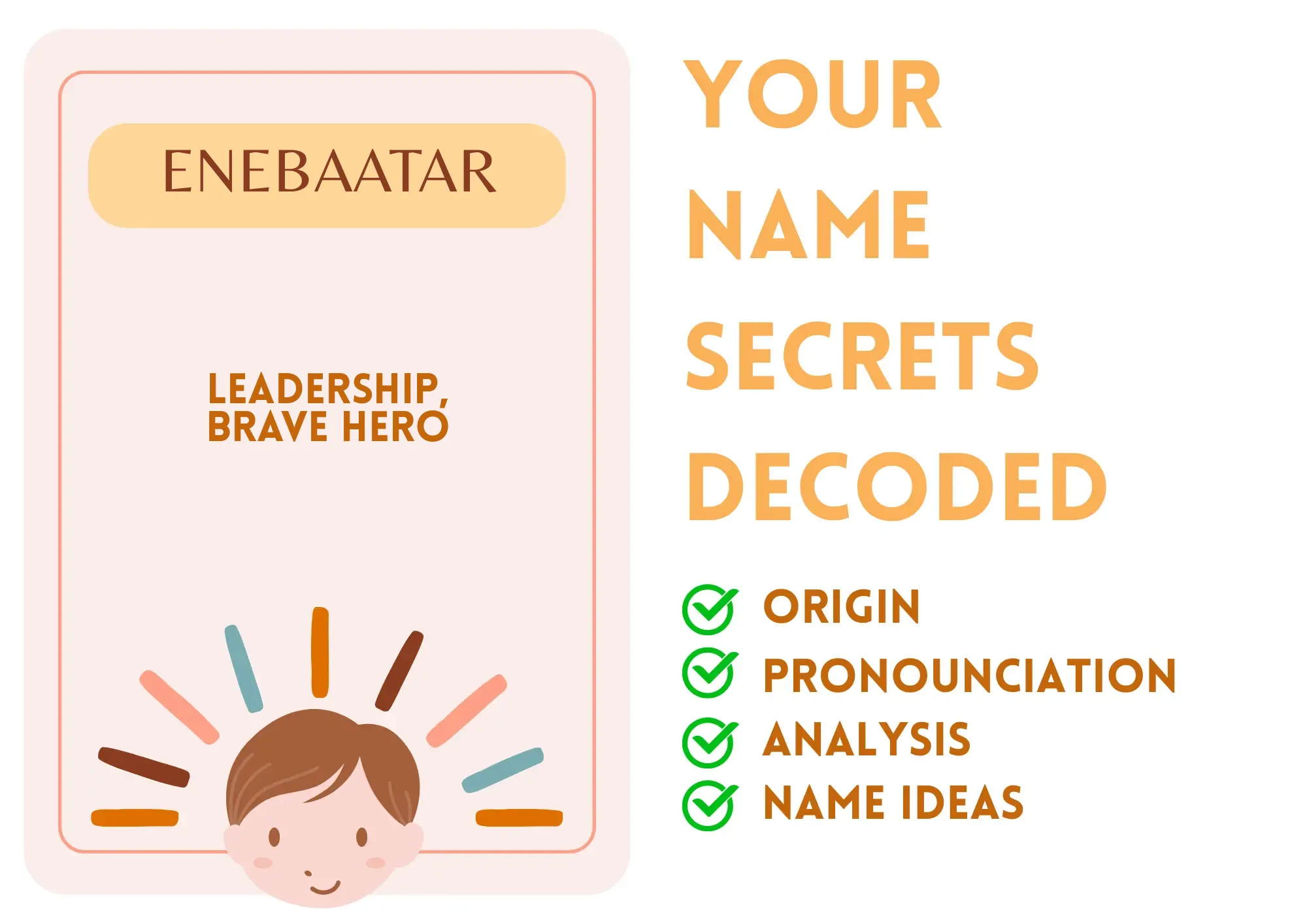
Enebaatar
Enebaatar is a unique and culturally rich name of Mongolian origin, translating roughly to 'leadership' or 'brave hero.' It is primarily used for males but can have unisex applications in certain contexts. The meaning of the name emphasizes strength, courage, and the qualities of a leader, making it a favored choice among parents seeking to impart these values to their children.
The name Enebaatar has historical significance within Mongolian culture, often associated with the rich tradition of leadership found within nomadic societies and the historical figures of Mongolian history. Families often choose this name to evoke the heroic spirit of past legends.
Despite its length, Enebaatar is enthusiastically embraced within its cultural context, with many people associating it with positive traits like bravery, honor, and nobility.
Basic Information
Gender: Boy
Sounds Like: Eh-neh-bah-tar
Pronunciation Explanation: The name is pronounced with emphasis on the second syllable, 'bah', while 'neh' is softer and 'tar' ends the name firmly.
Summary and Meaning
Meaning: leadership, brave hero
Origin: Enebaatar hails from Mongolia, where names often carry significant cultural and historical weight.
Usage: While primarily a masculine name, its strong meaning might resonate with unisex potential depending on familial traditions.
Name Number (Chaldean)
Name Number (Pythagorean)
Popularity (Global Rank)
Overall: 1327923
Boys: 72681
Most Popular in
Religious and Cultural Significance
Religion: Tengrism (historically)
Background: Tengrism is a traditional belief system in Mongolia, where nature and ancestral spirits are honored, including the valor associated with brave leaders and heroes.
Cultural Significance: The name Enebaatar exemplifies the qualities of leadership celebrated in Mongolian culture; it pays homage to historical figures and the nomadic lifestyle of the Mongolian people.
Historical Significance: Historically, Mongolia has produced numerous leaders and heroes. Enebaatar reflects this tradition, symbolizing the virtues of bravery and respect within the context of Mongolian history.
Popular Culture
Literature and Mythology: While not widely used in mainstream literature, the name may appear in stories or poems emphasizing courage and leadership reminiscent of Mongolian folklore.
Movies and Television: The name may not currently appear in notable films or shows but resonates with themes common in epic tales reflecting on heroes and historical figures.
Feelings and Perceptions
Perception: Enebaatar is generally perceived as a strong and meaningful name reflecting qualities of respect and valor. People often have positive feelings associated with it.
Positive Feelings: Proud, noble, strong, revered, culturally significant.
Negative Feelings: Might seem unusual or difficult to pronounce for those unfamiliar with Mongolian phonetics.
Practical Considerations
Ease of Writing and Calling: Enebaatar, although longer, has distinct syllables making it relatively easy to write and call in its cultural context, though it may pose challenges for speakers not familiar with Mongolian.
Common Typos and Misspellings: Enebatarr,Enbataar,Enebaar,Enebatar
Common Nicknames: Ene,Baatar
Enebaatar Popularity
Enebaatar Usage and Popularity By Country
| Country | Rank (Overall) |
|---|---|
| Philippines | 100268 |
| United States | 539518 |
Enebaatar Usage and Popularity By City
| City | Rank (Overall) |
|---|
Compatibility Analysis
Famous Persons Named Enebaatar
No results found for Enebaatar.
Related Names
Similar Sounding Names:
Enkhtaivan,Enebol,Bat,Davaa